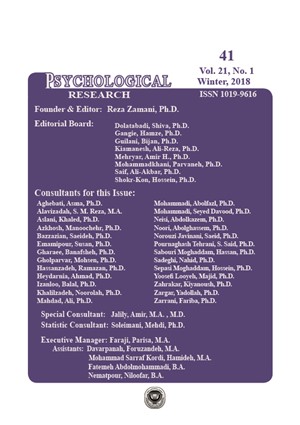-
-
List of Articles
-
Open Access Article
1 - Comparison of Hope and Self-Efficacy of Successful (without Lapses) and Failed (with Repeated Lapses) Addicts Under Maintenance Methadone Therapy
Tooraj Sepahvand -
Open Access Article
2 - Predicting Marital Quality Based on Relationship Beliefs and Emotional Creativity
Ali Akbar Solimanian -
Open Access Article
3 - Causal Relation of Metacognition and Feeling of Fatigue Mediated by Coping Strategies and Perfectionism
somayeh saeedi Dehaghani -
Open Access Article
4 - Comparison of Hope and Self-Efficacy of Successful (without Lapses) and Failed (with Repeated Lapses) Addicts Under Maintenance Methadone Therapy
-
Open Access Article
5 - Comparison of Hope and Self-Efficacy of Successful (without Lapses) and Failed (with Repeated Lapses) Addicts Under Maintenance Methadone Therapy
Tooraj Sepahvand -
Open Access Article
6 - Predicting Marital Quality Based on Relationship Beliefs and Emotional Creativity
Mahbubeh Amin ali akbar Soliemanian Ahmad Heydarnia -
Open Access Article
7 - Causal Relation of Metacognition and Feeling of Fatigue Mediated by Coping Strategies and Perfectionism
Somayeh Saeedi Dehaghani Jalil Babapor Kheiredin Khalil Esmaeilpour -
Open Access Article
8 - Investigation of Demand-Resources-Support Job Design Model in the Industrial, Financial, Healthcare, and Public Workplaces
Hamidreza Oreyzi hajar barati -
Open Access Article
9 - "Effectiveness of Emotion Regulation Skill Training Based on Dialectical Behavior Therapy on Depression of Orphans"
Masoumeh Akhondi mina Mojtabaei -
Open Access Article
10 - Effectiveness of Teaching Coping Skills According to CBT Based on Positive Psychology on Hope of High School Students with Adjustment Problems
Mitra Moslehi Jouybari Malek Mirhashemi
-
The rights to this website are owned by the Raimag Press Management System.
Copyright © 2017-2026







